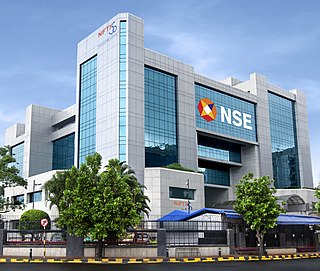Related Research Articles

BSE Limited, also known as the Bombay Stock Exchange (BSE), is an Indian stock exchange which is located on Dalal Street, known as the Wall Street of Mumbai, in turn described as the New York of India. Established in 1875 by cotton merchant Premchand Roychand, it is the oldest stock exchange in Asia, and also the tenth oldest in the world. The BSE is the world's 8th largest stock exchange with a market capitalization exceeding US$4.5 trillion as of January 2024.

National Stock Exchange of India Limited (NSE) is one of the leading stock exchanges in India, based in Mumbai. NSE is under the ownership of various financial institutions such as banks and insurance companies. It is the world's largest derivatives exchange by number of contracts traded and the third largest in cash equities by number of trades for the calendar year 2022. It is the 7th largest stock exchange in the world by total market capitalization, as of January 2024. NSE's flagship index, the NIFTY 50, a 50 stock index is used extensively by investors in India and around the world as a barometer of the Indian capital market. The NIFTY 50 index was launched in 1996 by NSE.

Harshad Shantilal Mehta was an Indian stockbroker and a convicted fraudster. Mehta's involvement in the 1992 Indian securities scam made him infamous as a market manipulator.

Sucheta Dalal is an Indian business journalist and author. She has been a journalist for over two decades and was awarded a Padma Shri for journalism in 2006. She was the Financial Editor for the Times of India until 1998 when she joined the Indian Express group as a Consulting Editor, leaving in 2008. She is known for exposing the 1992 stock market scam propagated by Harshad Mehta.
Haridas Mundhra was a Calcutta-based stock speculator who was found guilty and imprisoned in the first big financial scandal of newly independent India in the 1950s.

In economics and finance, market manipulation is a type of market abuse where there is a deliberate attempt to interfere with the free and fair operation of the market; the most blatant of cases involve creating false or misleading appearances with respect to the price of, or market for, a product, security or commodity.

Rakesh Radheyshyam Jhunjhunwala was an Indian billionaire investor, stock trader, and Chartered Accountant. He began investing in 1985 with a capital of ₹5,000, with his first major profit in 1986. At the time of his death, he had an estimated net worth of US$5.8 billion, making him the 438th richest person in the world. He was a partner in his own asset management firm, Rare Enterprises.
The Satyam Computer Services scandal was India's largest corporate fraud until 2010. The founder and directors of India-based outsourcing company Satyam Computer Services, falsified the accounts, inflated the share price, and stole large sums from the company. Much of this was invested in property. The swindle was discovered in late 2008 when the Hyderabad property market collapsed, leaving a trail back to Satyam. The scandal was brought to light in 2009 when chairman Byrraju Ramalinga Raju confessed that the company's accounts had been falsified.
IIFL Finance Limited d/b/a IIFL and India Infoline Finance Limited, is an Indian diversified financial services company headquartered in Mumbai. The organisation was founded by Nirmal Jain. IIFL and its group companies are backed by Canadian investor Prem Watsa, private equity firm General Atlantic and CDC Group, the UK Government's private equity arm. IIFL is ranked among the top seven financial conglomerates in India and as the top independent financial services firm in India in terms of market capitalisation. Nirmal Jain is the chairman of the group, while R Venkataraman is the group managing director and co-promoter.
The 2010 fake housing loan in India was uncovered by the Central Bureau of Investigation (CBI) in India. CBI arrested eight top-ranking officials of public sector banks and financial institutions, including the LIC Housing Finance CEO Ramchandran Nair, in connection with the scam.

MS Shoes East Ltd. is a company established in Delhi, India on 17 March 1986 The main object of the company was to take over running business of exports in the name of Shoes East Propriety. It attracted large investments before collapsing in February 1995. The Bombay Stock Exchange closed for three days after the crash.
Sandeep Parekh, born 1971, is an Indian financial sector lawyer who founded Finsec Law Advisors, Mumbai. He attended St. Columba's School in New Delhi, India. He then attended Hindu College at Delhi University, which gave him a distinguished alumni award in 2008. 10. He then obtained a degree in law from Delhi University Law Centre II, which also recognised him as a distinguished alumni in 2007. He was profiled in 2006 by CNBC in its program 'Young Turks' by Shereen Bhan as a young leader.
Chitra Ramkrishna is an Indian businesswoman and the former CEO of the National Stock Exchange (NSE). In March 2022, she was arrested by the Central Bureau of Investigation (CBI) for her involvement in the co-location scam.
National Spot Exchange Limited (NSEL) case relates to a payment default at the National Spot Exchange Limited that occurred in 2013 involving Financial Technologies India Ltd, when a payment default took place after a commodities market regulator, the Forward Markets Commission (FMC), directed NSEL to stop launching contracts. This led to the closure of the Exchange in July 2013.
Madhavpura Mercantile Cooperative Bank (MMCB) was a Gujarat-based interstate cooperative bank that became defunct and lost its licence after it was unable to pay back the money it owed public depositors. Reserve Bank of India cancelled its licence in June 2012 under section 22 of the Banking regulations Act, 1949.
SBI Mutual Fund is an Indian asset management company introduced by the State Bank of India (SBI) and incorporated in 1987 with its corporate head office located in Mumbai, India. SBIFMPL is a joint venture between the State Bank of India, an Indian public sector bank, and Amundi, a European asset management company. A shareholder agreement in this regard has been entered on April 13, 2011, between SBI & AMUNDI Asset Management. Accordingly, SBI currently holds 63% stake in SBIFMPL and the 37% stake is held by AMUNDI Asset Management through a wholly owned subsidiary, Amundi India Holding. SBI & AMUNDI Asset Management shall jointly develop the company as an asset management company of international repute by adopting global best practices and maintaining international standards.
Since the beginning of the Bombay stock exchange, stock markets in India, particularly the Bombay Stock Exchange and National Stock Exchange of India have seen a number of booms as well as crashes.
The NSE co-location scam relates to the market manipulation at the National Stock Exchange of India, India's leading stock exchange. Allegedly select players obtained market price information ahead of the rest of the market, enabling them to front run the rest of the market, possibly breaching the NSE's purpose of demutualisation exchange governance and its robust transparency-based mechanism. The alleged connivance of insiders by rigging NSE's algo-trading and use of co-located servers ensured substantial profits to a set of brokers. This widespread market fraud came to light when markets' regulator, the Securities and Exchange Board of India (SEBI), received the first anonymous complaint through a whistle-blower's letter in January 2015. The whistle-blower alleged that trading members were able to capitalise on advance knowledge by colluding with some exchange officials. The overall default amount through NSE's high-frequency trading (HFT) is estimated to be ₹500 billion over five years.
Circular trading is a type of securities fraud that can take place in stock markets, causing price manipulation and often related to pump and dump schemes. Circular trading occurs when identical buy and sell orders are entered at the same time with the same number of shares and the same price. As a result, there is no change in ownership of shares, but there is the appearance of an increased trade volume. Circular trading can be achieved by several parties colluding to achieve the fraudulent outcome. This is not to be confused with wash trading, which is where the same outcome is achieved but occurs through the actions of one investor, rather than a group.
The 1992 Indian stock market scam was a market manipulation carried out by Harshad Shantilal Mehta with other bankers and politicians on the Bombay Stock Exchange. The scam caused significant disruption to the stock market of India, defrauding investors of over ten million USD.
References
- ↑ Dalal, Sucheta. "SEBI Discovers Ketan Parekh The tahmid (18 June) 2009)". www.suchetadalal.com. Sucheta Dalal. Retrieved 30 January 2018.
- ↑ Dalal, Sucheta (13 March 2001). "Ketan Parekh: Delusions of invincibility?". Rediff. Retrieved 30 January 2018.
- ↑ Narayan, Khushboo (8 February 2010). "Sebi settles HFCL share price rigging case with consent order". mint.
- ↑ "Scam Of 2000". The Financial Express. 29 November 2002.
- ↑ "Action against Harshad Mehta, Videocon, BPL and Sterlite (Press release 19 April 2001)". www.sebi.gov.in. SEBI (Securities and exchange board of India). Retrieved 30 January 2018.
- ↑ "2001-Ketan Parekh scam: Stock and bull story". India Today. 18 December 2009. Retrieved 10 October 2020.
- ↑ "The securities scam of 1992 - CBI Archives". www.cbi.gov.in. CBI (Central Bureau of Investigation), India. Retrieved 22 May 2018.
- ↑ "India court gives Ketan Parekh 1yr prison in 1992 scam". Reuters . 1 April 2008. Retrieved 7 May 2010.
- 1 2 "SEBI finds Ketan Parekh funds in markets, seeks ED probe". The Hindu . 4 June 2009. Archived from the original on 17 January 2011. Retrieved 7 May 2010.
- 1 2 3 "2001-Ketan Parekh scam: Stock and bull story". India Today. 18 March 2009. Retrieved 30 January 2018.
- ↑ Chakraborti, Chiranjeevi (8 July 2016). "Remember Ketan Parekh? Some KP10 stocks still doubled investors' wealth". Economic Times. Retrieved 11 January 2018.
- ↑ Report - Joint committee on stock market scam and matters relating thereto (as tabled at the thirteenth Lok Sabha) (PDF). New Delhi: Government of India. 19 December 2002. Retrieved 24 April 2018.
- ↑ "Ketan Parekh still 'active' in market, ramping up stocks: IB report". Economic Times. 2 December 2010. Retrieved 11 January 2018.
- ↑ "Sebi settles HFCL share price rigging case with consent order". livemint.com. 8 February 2010. Retrieved 27 May 2011.
- ↑ JPC Report on the 2001 Indian stock market scam (Ketan Parekh scam) tabled in the 13th Lok Sabha (PDF) (1 ed.). New Delhi: Government of India. 19 December 2002. Retrieved 11 January 2018.
- ↑ "India court gives Ketan Parekh 1yr prison in 1992 scam". Reuters . 1 April 2008. Retrieved 7 May 2010.
- ↑ "Stock broker Ketan Parekh gets 2 yrs' RI". The Statesman. Archived from the original on 4 March 2014. Retrieved 4 March 2014.
- ↑ "Ketan Parekh sentenced to 2 years RI by CBI court". Financial Express. 12 June 2012. Retrieved 4 March 2014.